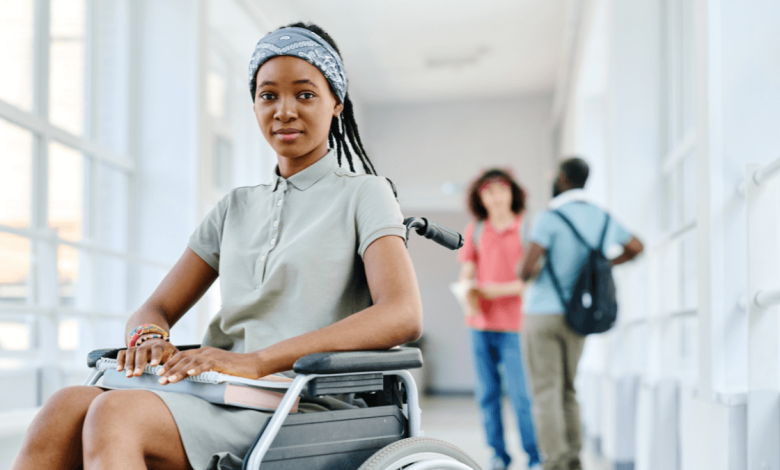NSFAS and Disability: What Additional Support Can You Get?

If you’re a student living with a disability in South Africa, navigating the higher education journey can come with unique challenges—from accessibility concerns to added financial needs. But help is available. The National Student Financial Aid Scheme (NSFAS) offers specialised support for students with disabilities beyond regular tuition and accommodation funding.
This guide will walk you through the NSFAS Disability Bursary, what it covers, who qualifies, and how to apply. Whether you’re a learner, parent, or educator, this article will help you understand how NSFAS supports inclusive education in South Africa.
What Is the NSFAS Disability Bursary?
The NSFAS Disability Bursary Programme is a government-funded initiative designed to assist students with disabilities who are studying at public universities and TVET colleges. It goes beyond standard NSFAS packages to address additional needs that arise from living with a disability.
Key Purpose
Its aim is to remove financial barriers so that all students can succeed academically regardless of physical, mental, sensory, or learning challenges.
Who Qualifies for the NSFAS Disability Bursary?
To qualify, you must:
- Be a South African citizen.
- Have a disability as defined in the Disability Framework for Post-School Education and Training.
- Be accepted or enrolled at a public university or TVET college.
- Meet academic progression requirements.
- Submit proof of household income below R600,000 per year.
What Counts as a Disability?
The bursary covers both temporary and permanent disabilities, including:
- Visual or hearing impairments
- Physical disabilities requiring assistive devices
- Learning disabilities such as dyslexia
- Chronic illnesses that impair academic function
Tip: Even if your condition is not visibly apparent, you may still qualify. Always include medical evidence.
What Additional Support Does NSFAS Offer for Students with Disabilities?
1. Full Cost of Study
Like regular NSFAS bursaries, the disability bursary covers:
- Tuition fees
- Registration fees
- Prescribed books
- Accommodation (or transport if staying at home)
2. Assistive Devices and Equipment
NSFAS may pay for assistive technology such as:
- Wheelchairs or walking aids
- Braille equipment
- Hearing aids
- Screen-reading software
- Magnification devices
- Laptops with accessibility features
3. Human Support
Depending on your needs, NSFAS can also fund:
- Sign language interpreters
- Personal assistants
- Scribes or note-takers
- Tutors for students with learning difficulties
Pro Tip: Submit quotations from registered service providers when applying for assistive devices or human support services.
How to Apply for the NSFAS Disability Bursary
Step-by-Step Guide
- Create a myNSFAS account on www.nsfas.org.za.
- Fill out the online application form and select the Disability Bursary option.
- Upload the following documents:
- Certified copy of your South African ID
- Proof of income (for yourself and household)
- Medical or psychological report (not older than 1 year)
- Quotation for assistive devices or support services (if needed)
- Submit your application before the closing date.
- Track your application status online.
Important Dates
Applications usually open between September and November each year for the following academic year. Check the official NSFAS website for confirmed dates and updates.
Application Checklist
Here’s a handy checklist to keep your application on track:
- South African ID copy
- Proof of income (payslip, SASSA letter, etc.)
- Medical report with diagnosis
- Acceptance letter from a public institution
- Quotes for support services/devices
- Complete online application via myNSFAS
Common Mistakes to Avoid
Avoid these pitfalls that can delay or cancel your funding:
- Submitting outdated medical reports
- Missing the application deadline
- Not specifying support needs clearly
- Failing to submit cost estimates for assistive devices
Quick Tip: If unsure, reach out to your university’s Disability Unit for help with documents and quotations.
Also check: Bursary and Scholarship: What’s the Difference and Which Should You Apply For?
Success Story: How NSFAS Helped a Blind Student Graduate
Thabo, a blind student from the Eastern Cape, received NSFAS disability support to study law at the University of Fort Hare. The bursary paid for:
- Braille printer and screen reader software
- Full tuition and residence
- A personal assistant to assist during lectures
With this support, Thabo completed his degree and is now working at a legal aid clinic. Stories like his show how the NSFAS Disability Bursary changes lives.
Where to Get Help or More Information
If you need help with your application, contact:
- NSFAS Call Centre: 08000 67327
- Email: [email protected]
- Website: www.nsfas.org.za
- Visit your campus Disability Unit or Financial Aid Office
You can also refer to the Department of Higher Education and Training site: www.dhet.gov.za
Also check: If you’re a student living with a disability in South Africa, navigating the higher education journey can come with unique challenges—from accessibility concerns to added financial needs. But help is available. The National Student Financial Aid Scheme (NSFAS) offers specialised support for students with disabilities beyond regular tuition and accommodation funding.
Read more: Bursary Application Checklist: Documents You Must Have
Every student deserves the chance to study with dignity and support. The NSFAS Disability Bursary helps make that a reality for South African learners with disabilities. By covering tuition, assistive devices, and personal support, it opens the doors to inclusive higher education.
Take action now: If you or someone you know needs this bursary, start preparing your documents and check www.nsfas.org.za for the latest updates.




